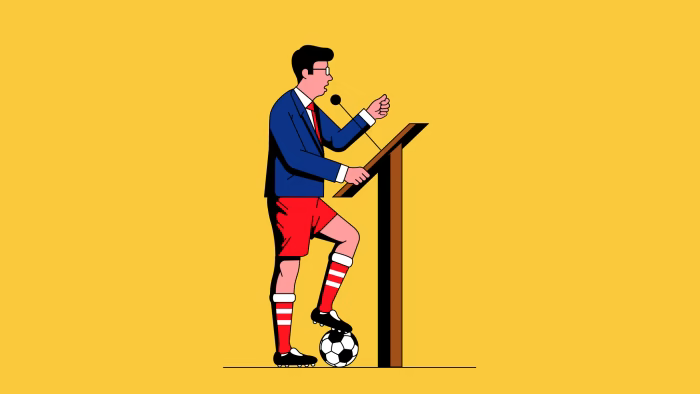In 2005, the world was not sure whether Cote d’Ivoire could continue to exist. Home to over three million Ivorians of about 60 different ethnic groups, the coastal African nation was torn by a three-year-long civil war. Despite attempts by both France and the United Nations to de-escalate, tensions were reigniting between the Ivorian government and its rebel enemies. Families across the nation braced themselves for a new wave of violence, their daily lives rife with fear and division.
Enter soccer. Led by star striker Didier Drogba, the national men’s soccer team was an underdog success story as it fought to qualify for the FIFA World Cup, the world’s biggest sports tournament. Cote d’Ivoire was momentarily united again when they succeeded in a dramatic victory against the Cameroonian team. Vice journalist Kingsley Kobo, who was present at the match, noted how the game erased divisions that had previously been cause for violence, uniting rebels and government supporters, Christians and Muslims, and ethnic groups of all sizes. A citizen he interviewed said, “We completely forgot about the tense political situation that was prevailing in the country and focused on football.” Another citizen recalled that “the whole country—every person, every house—was happy. That day we all forgot the country was still divided.” After the match, people from politically opposed regions, religions, and ethnicities were seen chatting excitedly about the game and carpooling home, their bitter divisions erased by eleven men and a soccer ball.
Those eleven men sensed the political significance of the moment and seized their opportunity. In the locker rooms after the match, they filmed a video, less than one minute long, pleading for an end to the civil war and for elections. Drogba himself stated, “We proved today that all Ivorians can coexist and play together with a shared aim,” unequivocally calling for unity and healing in a time of division and fear.
The video spread like wildfire. In a time when all other institutions failed, it was soccer that provided leadership, unity, and identity to millions. In the following months, the civil war belligerents resumed negotiations with the aid of the UN and eventually signed an agreement for a ceasefire. Drogba and his team did not solve everything—more civil wars would break out in due time—but extraordinary political change, however temporary, was achieved through sport.
Meanwhile, most Americans do not even care about soccer, opting for their own version of “football.” But they should care. In fact, if you care about upholding human rights, saving democracy, or fighting poverty, you have no choice but to care. And political scientists seeking to understand how culture and politics collide absolutely, certainly, definitely should care.
Soccer is, without competition, the most widely watched, culturally powerful sport in the world. The FIFA World Cup attracts more global viewership than the Olympics, with an estimated five billion tuning in to watch the global tournament just last year. Beyond just the game itself, individual players also hold incredibly large, dedicated fanbases. Those millions and billions of people do not only casually follow the sport. Soccer fans are notoriously passionate, their supported clubs often being deeply ingrained in their family history, personal pride, and local culture. When Brazil lost the 1950 World Cup to their international rival, Uruguay, the pain of the loss tragically pushed many Brazilian fans to suicide. Soccer isn’t a sport—it’s a platform, a bullhorn that reaches the hearts and minds of billions.
Few clubs exemplify that platform power more than FC Barcelona, which literally wears its political ties on its sleeves. Their home city is the capital of Catalonia, a region of Spain with a significant faction—40% in a recent poll—desiring secession from the rest of the country. In fact, Catalonia’s regional parliament triggered a constitutional crisis in 2017 by declaring itself independent in a 70-10 vote.
The reasons for Catalonia’s independence movement, a political struggle spanning over a century, are complex. Along with having their unique subculture and language, Catalonian separatists feel disillusioned with Spain’s national government. Inflamed by significant cuts in public spending in the 2008 financial crisis, separatist Catalonians claim that Spain’s federal government repeatedly fails to accommodate or represent Catalonia’s interests despite their significant contributions to the union—including, but not limited to, about a fifth of Spain’s total GDP. The Spanish government’s controversial, inconsistent, and sometimes violent responses to the movement over many years also certainly don’t help.
Again, enter soccer. For most people in the world, FC Barcelona represents a historically successful soccer franchise, one of the biggest in the sport. But for Catalonians, FC Barcelona has represented and backed their community when the Spanish government has not. The club even honors Catalonia’s flag in its emblem. FC Barcelona was a signatory for referendums on Catalonian independence deemed illegal by the Spanish government and called for freedom of speech and protections for Catalonians on multiple occasions. The club’s players, managers, and fanbase also echo the need for referendums and further democratic representation on Catalonia’s fate despite the efforts of the Spanish government to stamp out such “disobedience”. These messages of support also culminated in action when clashes between police and protestors grew violent in 2017. In protest of the violence, FC Barcelona kept its almost 100,000-visitor-capacity stadium empty during a match “so that the world can see how we’re suffering under the absence of democracy here in Catalonia,” according to the club’s president.
Over time, the club has become an increasingly politicized representative for the region, a globally-known institution using its platform to foster ostensibly pro-democratic movements. Its fans ritualistically stand and chant for Catalonian independence at the 17-minute mark of each match, in reference to the year 1714 when Catalonia first fell to the Spanish crown in the War of Succession. Its storied rivalry against Real Madrid, arguably the most famous in soccer’s history, is in no small part born from the contrast between Madrid’s high-class unionist dispositions and Barcelona’s working-class, Catalonian roots. Even its business structure could be seen as a democratic government, as it’s a supporters-owned club with fan members voting on decisions and electing its president every six years.
While the Ivorian men’s soccer team represented a straightforward use of soccer’s platform to address a single political crisis, FC Barcelona represents how the sport’s social context, location, fanbase, financial power, and influence can be used to empower foundation-shaking political movements over the course of decades. While a rare case, Barcelona illustrates that this cultural powerhouse of a sport can produce leaders, movements, and platforms akin to political institutions. Governments can shape laws and legislation, but soccer’s intense proximity to daily life and culture grants the sport a unique ability to shape hearts and minds—a political resource clearly on display in Barcelona.
Soccer is a simple sport. At the end of the day, it only requires a ball and some flat space to play. Yet despite its simple elements, it halted a civil war and nourished a ground-breaking secessionist movement in one of Europe’s largest economies. The stories don’t stop there. These are by far not the first examples of the sport’s political impact, nor will they be the last. Even more factors—the game itself, the team’s management, the sociopolitical context, and the fanbase—all shape how soccer impacts politics, or vice versa, in any given instance. There’s a wealth of history and fascinating relationships between sport and power that lie within a soccer field, but it’s easy to miss if one doesn’t look properly.
According to UC Berkeley, Political Science is defined as “exploring the exercise of power in its myriad forms and consequences.” Yet political scientists often confine this exploration to the few, familiar spaces in which power most explicitly resides: pulpits, swords, voting booths, judge’s gavels, ink on parchment. Power is more complicated, diverse, and multi-faceted than that, and soccer exemplifies this in a uniquely poetic way. The emperors and monarchs of politics long past would never dream that power such as theirs could be wielded through the cleats of an athlete. Yet it now has. Who’s to say that power won’t take an even more unexpected form in the future? What will be the next chapter in human history that soccer changes? And can political science afford to overlook it? These questions are why I share the stories I’ve shared, why political science must expand its academic view, and why you should care about soccer—not necessarily because it’s fun to watch, but because in any match, there are far more players than just those on the field, and far more at stake than just goals.
Featured Image: Harry Haysom






Comments are closed.